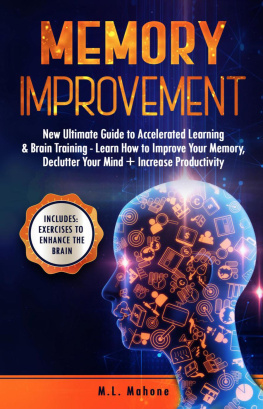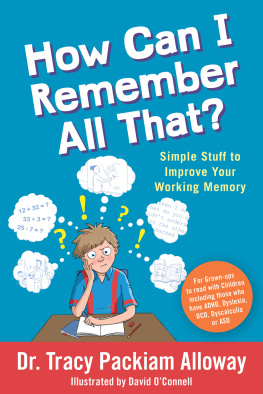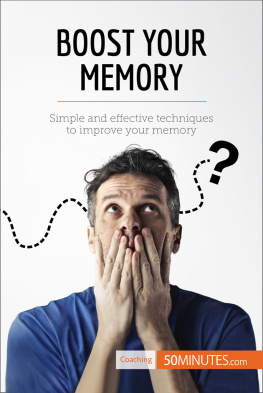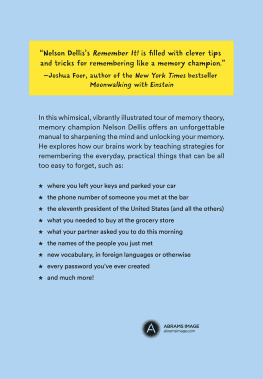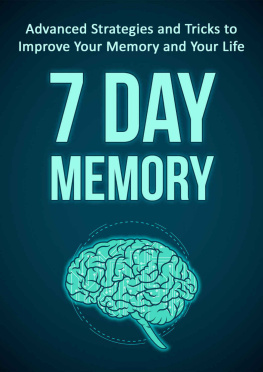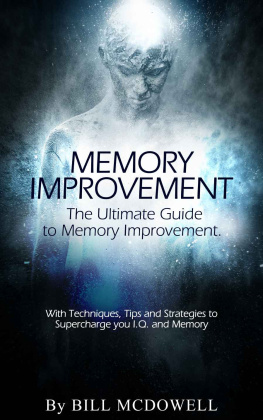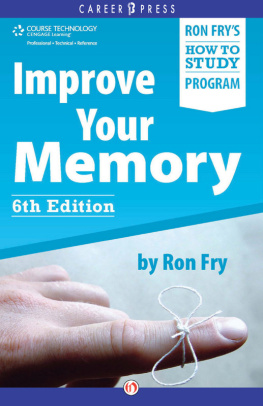How to Improve Your Memory
An everyday guide to improving your memory. Advance and helpful strategies to help you remember things and increasing learning
By
U.S Robert
Copyright 2020 by (U.S Robert)- All rights reserved.
This document is geared towards providing exact and reliable information in regards to the topic and issue covered. The publication is sold with the idea that the publisher is not required to render accounting, officially permitted, or otherwise, qualified services. If advice is necessary, legal or professional, a practiced individual in the profession should be ordered.
- From a Declaration of Principles which was accepted and approved equally by a Committee of the American Bar Association and a Committee of
Publishers and Associations.
In no way is it legal to reproduce, duplicate, or transmit any part of this document in either electronic means or in printed format. Recording of this publication is strictly prohibited and any storage of this document is not allowed unless with written permission from the publisher. All rights reserved.
The information provided herein is stated to be truthful and consistent, in that any liability, in terms of inattention or otherwise, by any usage or abuse of any policies, processes, or directions contained within is the solitary and utter responsibility of the recipient reader. Under no circumstances will any legal responsibility or blame be held against the publisher for any reparation, damages, or monetary loss due to the information herein, either directly or indirectly.
Respective authors own all copyrights not held by the publisher.
The information herein is offered for informational purposes solely, and is universal as so. The presentation of the information is without contract or any type of guarantee assurance.
The trademarks that are used are without any consent, and the publication of the trademark is without permission or backing by the trademark owner. All trademarks and brands within this book are for clarifying purposes only and are the owned by the owners themselves, not affiliated with this document.
Contents
Introduction
M emory is made to recall and gives us the opportunity from past experiences to learn and adapt. We do know that memory processing basically has three phases or steps: encoding, storage, and recall. Encoding is the first step in forming a memory: it is when you remember an occurrence or come across any information, and the sounds, pictures, physical sensations, or other sensory details involved are actively perceived by your brain.
Broadly there are three types of memory. Sensory memory allows people to attain memories of sensory information after the initial sensation has stopped. Echoic memory (the sensory information store) and haptic memory (the tactile sensory store) are two other forms of sensory memory that have been widely studied. Sensory memory, like short- and long-term memory, is not involved in higher cognitive functions; it is not controlled consciously.
Short-term memory is also known as working memory. It holds only a few objects and only lasts for around 20 seconds. Via processes like the rehearsal, though, objects can be transferred from short-term memory to long-term memory.
Long term memory : All the memories we retain for periods of time longer than a few seconds are long-term memories; long-term memory covers everything from what we studied in the first grade to our home address to what we wear yesterday to work. Long-term memory has an extremely lot of storage space, and some memories will last from the moment they are formed until we die.
Storage : In various parts of the brain, all of these little bits and pieces of information are then processed. The neurons the nerve cells in your brain transmit signals to each other about what you perceive, "talk" to each other effectively and create either temporary or long-lasting links. Neuroscience thinks it's that neural activity and the strength of those connections that make a memory.
Recalling and finally, your brain "replays" or revisits the nerve pathways created when the memory was formed to retrieve a memory. Repeatedly recalling data helps to reinforce those connections and your memories, which is why techniques such as reviewing your notes or using flashcards help you retain data.
Sleep : In general, with better sleep, daily exercise, and a better diet, improving your mental health will improve your brain health, including memory, as well as your physical health. These things will give you the most significant kick in preventing memory loss and improving your memory overall.
Specific memory tricks: will help you better remember details of anything you're learning, beyond living a healthy lifestyle. Mnemonics means any system or device designed to support memory, typically letter patterns, ideas, or associations, such as ROYGBIV, to remember the rainbow's colors.
Chunking : To remember or share a phone number, you are likely to chunk the numbers so that they are easier to remember: "888" "555" "0000"-rather than the more memory-intensive" 8 8 8 8 5 5 5 0 0 0 0.
Animate the images : The more you can make these images animated and vibrant, the better. Doing this creates deeper, fresh links between the word or number and an image in your brain.
Writing : There are a few explanations of why handwriting is superior to using your laptop when it comes to memory. First, the physical act of writing activates cells at the base of your brain, called the reticular activating system (RAS). When the RAS is activated, your brain pays more attention to what you're doing at the moment.
Chapter 1: Memory Formation Process
M emory refers to the processes used to obtain, store, retain, and retrieve the information later on. In memory, there are three major processes involved: encoding, storage, and recovery. The ability to preserve and recover data that we have learned or experienced involves human memory. Yet, as we understand, this is not a flawless process. We forget the information often. Sometimes things in the first place are not properly encoded in memory.
Memory disorders can range from small irritations like forgetting where you left your car keys to serious conditions that impair the quality of life and the ability to work, such as Alzheimer's and other forms of dementia. For thousands of years, the research of human memory has been a subject of science and philosophy and has become one of cognitive psychology's major topics of interest.
The information must be changed into a usable form, which occurs through the process known as encoding, in order to form new memories. Once the information has been encoded successfully, it must be stored for later use in memory. Most of the time, much of this stored memory lies outside our awareness, except when we need to actually use it. The process of retrieval enables us to bring stored memories into conscious awareness.
1.1 What is Human Memory?
Memory is our capacity in the human brain to encode, store, maintain, and eventually remember data and past experiences. In general terms, it can be thought of as the use of prior experience to impact or influence current behavior. It was hypothesized for a time during the 1960s that all of the human body's cells were capable of storing memories, not just those in the brain, an idea known as cell memory.
This was based on research on memory transfer using cannibal flatworms and on anecdotal evidence of organ transplants where new habits or memories were reported to have been developed by the recipient, but these theories are now viewed pseudoscientific and have not been made into science journals.



